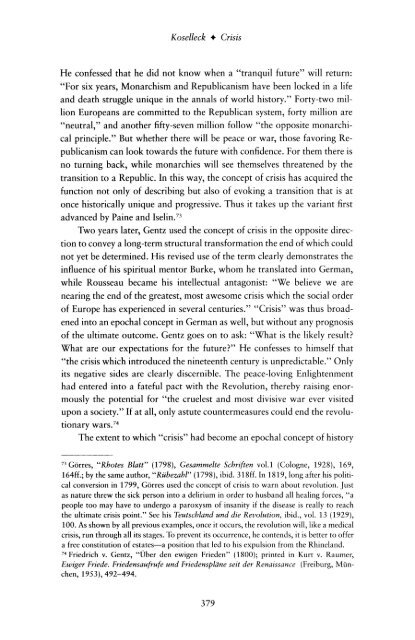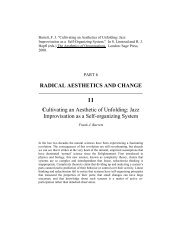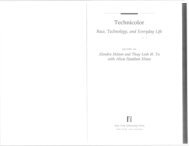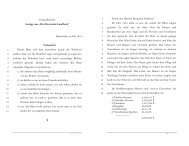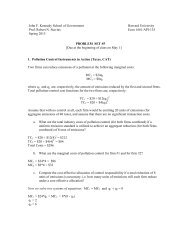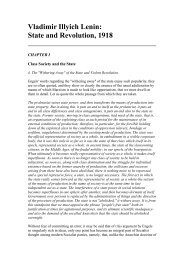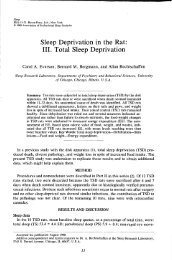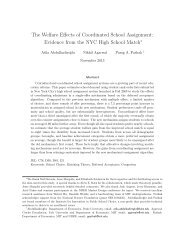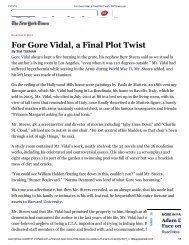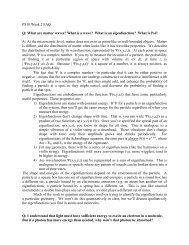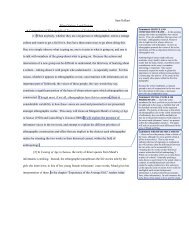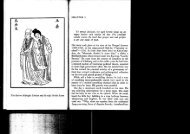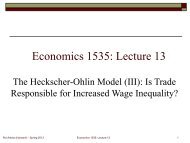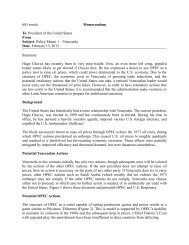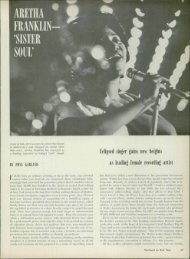CUisis AuthoU(s): ReinhaUt Koselleck and Michaela W ... - iSites
CUisis AuthoU(s): ReinhaUt Koselleck and Michaela W ... - iSites
CUisis AuthoU(s): ReinhaUt Koselleck and Michaela W ... - iSites
Create successful ePaper yourself
Turn your PDF publications into a flip-book with our unique Google optimized e-Paper software.
<strong>Koselleck</strong> + Crisis<br />
He confessed that he did not know when a "tranquil future" will return:<br />
"For six years, Monarchism <strong>and</strong> Republicanism have been locked in a life<br />
<strong>and</strong> death struggle unique in the annals of world history." Forty-two mil-<br />
lion Europeans are committed to the Republican system, forty million are<br />
"neutral," <strong>and</strong> another fifty-seven million follow "the opposite monarchi-<br />
cal principle." But whether there will be peace or war, those favoring Re-<br />
publicanism can look towards the future with confidence. For them there is<br />
no turning back, while monarchies will see themselves threatened by the<br />
transition to a Republic. In this way, the concept of crisis has acquired the<br />
function not only of describing but also of evoking a transition that is at<br />
once historically unique <strong>and</strong> progressive. Thus it takes up the variant first<br />
advanced by Paine <strong>and</strong> Iselin.73<br />
Two years later, Gentz used the concept of crisis in the opposite direc-<br />
tion to convey a long-term structural transformation the end of which could<br />
not yet be determined. His revised use of the term clearly demonstrates the<br />
influence of his spiritual mentor Burke, whom he translated into German,<br />
while Rousseau became his intellectual antagonist: "We believe we are<br />
nearing the end of the greatest, most awesome crisis which the social order<br />
of Europe has experienced in several centuries." "Crisis" was thus broad-<br />
ened into an epochal concept in German as well, but without any prognosis<br />
of the ultimate outcome. Gentz goes on to ask: "What is the likely result?<br />
What are our expectations for the future?" He confesses to himself that<br />
"the crisis which introduced the nineteenth century is unpredictable." Only<br />
its negative sides are clearly discernible. The peace-loving Enlightenment<br />
had entered into a fateful pact with the Revolution, thereby raising enor-<br />
mously the potential for "the cruelest <strong>and</strong> most divisive war ever visited<br />
upon a society." If at all, only astute countermeasures could end the revolu-<br />
tionary wars.74<br />
The extent to which "crisis" had become an epochal concept of history<br />
73 Gorres, "Rhotes Blatt" (1798), Gesammelte Schriften vol.1 (Cologne, 1928), 169,<br />
164ff.; by the same author, "Riibezahl" (1798), ibid. 318ff. In 1819, long after his political<br />
conversion in 1799, G6rres used the concept of crisis to warn about revolution. Just<br />
as nature threw the sick person into a delirium in order to husb<strong>and</strong> all healing forces, "a<br />
people too may have to undergo a paroxysm of insanity if the disease is really to reach<br />
the ultimate crisis point." See his Teutschl<strong>and</strong> und die Revolution, ibid., vol. 13 (1929),<br />
100. As shown by all previous examples, once it occurs, the revolution will, like a medical<br />
crisis, run through all its stages. To prevent its occurrence, he contends, it is better to offer<br />
a free constitution of estates-a position that led to his expulsion from the Rhinel<strong>and</strong>.<br />
74 Friedrich v. Gentz, "Ober den ewigen Frieden" (1800); printed in Kurt v. Raumer,<br />
Ewiger Friede. Friedensaufrufe und Friedenspline seit der Renaissance (Freiburg, Miinchen,<br />
1953), 492-494.<br />
379


